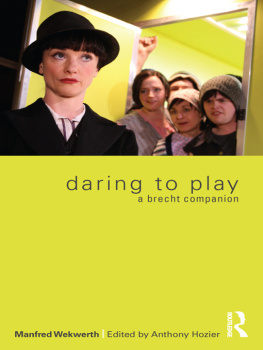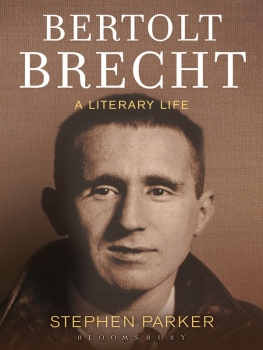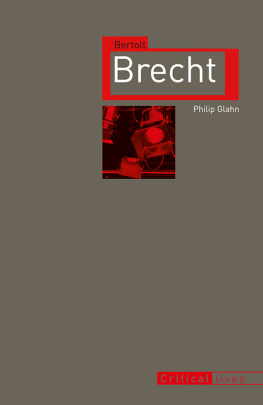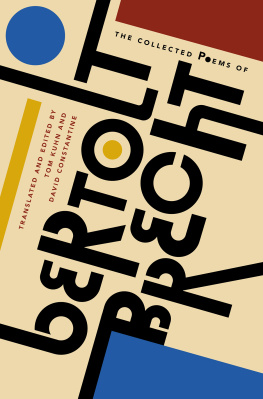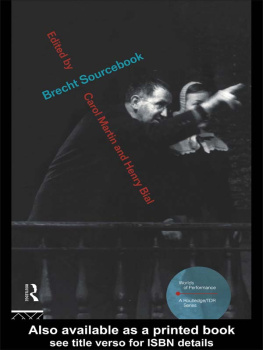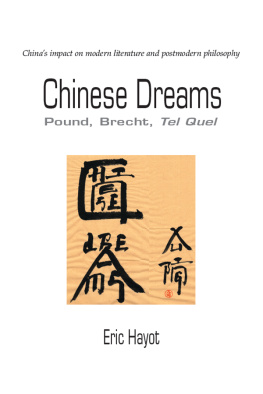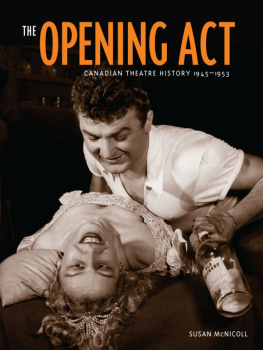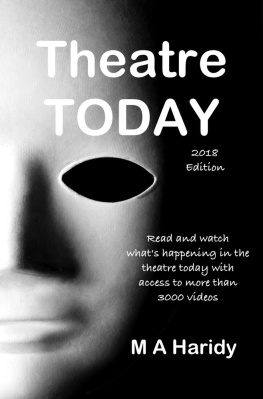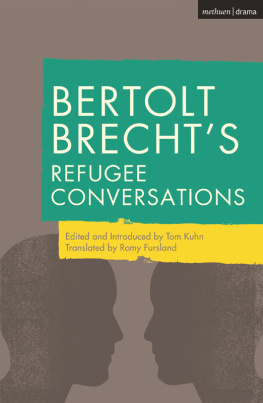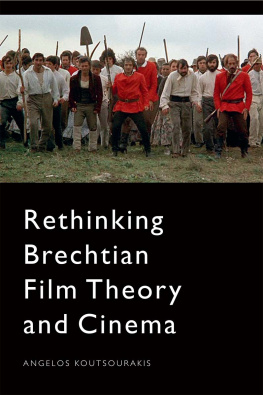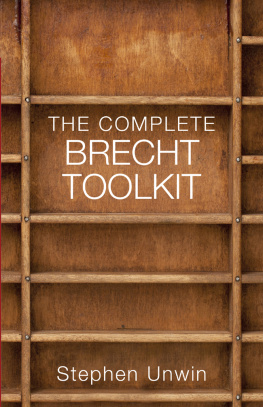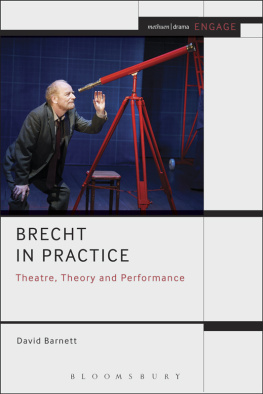ILLUSTRATIONS
| 1 |
| 2 |
| 3 |
| 4 |
| 5 |
| 6 |
| 7 |
| 8 |
| 9 |
| 10 |
| 11 |
| 12 |
| 13 |
| 14 |
| 15 |
| 16 |
| 17 |
ACKNOWLEDGEMENTS
I particularly wish to thank Professor Nesta Jones and the Research Committee of Rose Bruford College for generously providing a grant towards this translation. Manfred Wekwerth has had a close relationship with the college since he was invited to lead its Symposium on Brecht in 2000 and was awarded an Honorary Fellowship in 2002. It is fitting, therefore, that the college should now be able support the translation of the first of his books to appear in English.
It has been a great pleasure to work with Rebecca Braun on this translation. Through our continual dialogue her care and attention to detail has enabled me to learn so much more about the things I thought I knew. I know that Rebecca herself, in turn, would like to thank Tom Kuhn and Ritchie Robertson for their advice in response to occasional issues of translation.
For permission to include photographs, I would like to thank the following: Vera Tenschert, Hilda Hoffmann, Manfred Wekwerth, Tassilo Leher, Getty Images and ArenaPAL. I would also like to thank the following people for their help in tracing images: Frau Uta Kohl and Dr Asja Braune of Bertolt-Brecht-Archiv/Akademie der Knste, Grischa Meyer and Amy Stolarczyk. Every effort has been made to seek permission to reproduce copyright material before the book went to press. If any proper acknowledgement has not been made, the publisher would invite copyright holders to inform them of the oversight. I would also like to thank the staff of the Library of Rose Bruford College for their support in tracking texts and other material.
At Routledge, I would like to thank Talia Rodgers for her enthusiasm, great encouragement and advice, and Niall Slater for his unfailing support and guidance.
I owe thanks to Bernd Keler and Chris Baldwin, theatre directors and friends, who brought Manfred Wekwerth to lead a symposium in the UK a decade ago. Finally, I want to express my gratitude to two people who have been particularly generous with their time and help: to Grit Eckert for her boundless patience and support in assisting me in correspondence; and to Angelika Haas for her friendly advice on many matters and for all she has done in helping me to secure illustrations for this book.
AH
MANFRED WEKWERTH CHRONOLOGY AND KEY PUBLICATIONS
This chronology includes principal productions (at Berliner Ensemble unless specified).
| 1951 | After training as a teacher in Kthen, MW takes his amateur production of Brechts Senora Carrars Rifles to Brecht in Berlin. Brecht invites Wekwerth to train at the Berliner Ensemble. |
| 1953 | Directs Brechts The Mother in Vienna. Assistant to Brecht on Strittmatters Katzgraben .
Co-director with Brecht on The Caucasian Chalk Circle and Bechers Winterschlacht . |
Illustration 13 (l. to r.) Carlo Ponti, Sophia Loren, Vittorio de Sica, Wolf Kaiser, Kurt Bork, Manfred Wekwerth, Helene Weigel (Berlin, 1963). (Photograph by Karl Leher, courtesy of Tassilo Leher.)
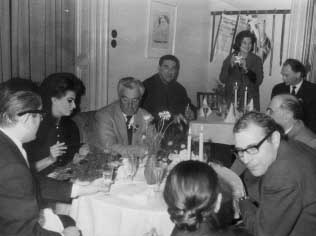
| 195657 | After the death of Brecht leads the directorial team under Helene Weigel. Directs Brechts The Days of the Commune with Benno Besson, in Karl-Marx Stadt, Vishnevskiys Optimistic Tragedy , and film version of Brechts The Mother (with Helene Weigel). |
| 195960 | Directs Brechts The Resistible Rise of Arturo Ui , with Palitzsch. (Production, with Ekkehard Schall in the lead, receives the Thtre des Nations prize and critics award in Paris.) Directs film of Mother Courage with Palitzsch (with Helene Weigel). |
| 1961 | Becomes principal director of the Berliner Ensemble. |
| 196269 | Productions include: The Days of the Commune , Brechts version of Shakespeares Coriolanus (with Weigel and Schall); Kipphardts The Matter of J. Robert Oppenheimer with Tenschert; Brechts St Joan of the Stockyards , with Joachim Tenschert; Baierls Johanna von Dbeln . Guest productions of the Berlin Ensemble in Paris, London, Moscow, Venice, Frankfurt, Prague, Budapest, Vienna, Warsaw. |
| 1969 | Leaves Berliner Ensemble. |
| 1970 | Awarded doctorate by Humboldt University. |
Illustration 14 With Helene Weigel in canteen of Berliner Ensemble (1965). (Photograph courtesy of Vera Tenschert.)
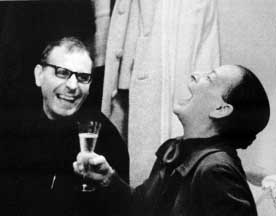
| 197077 | Freelance productions include: Gorkys Yegor Bulytchov ; Shakespeares Richard III at Deutsches Theater, and Brechts The Good Person of Szechwan at Schauspielhaus Zrich (with Renate Richter as Shen Te). Guest performances in Sweden, Finland, France, Austria. |
| 1971 | Invited by Laurence Olivier to direct (with Tenschert) Coriolanus at the National Theatre, London (with Anthony Hopkins in title role). |
| 197177 | Directs films for television including: Vishnevskiys Optimistic Tragedy and Dorothy Lanes Happy End . |
| 1974 | Director of the new Institut fr Schauspielregie (Institute of Theatrical Direction) in Berlin. |
| 197791 | Returns as Director of the Berliner Ensemble. |
| 197782 | Productions include: Brechts Galilei (Danish version) with Tenschert; Volker Brauns The Great Peace with Tenschert; Brechts Turandot or the Whitewashers Congress with Tenschert; Brechts Threepenny Opera with Kern; Eislers Johann Faustus with Tenschert. Guest performances in: Toronto, Vienna, Caracas, Rome, Bari, Milan, Venice, Jerusalem, Paris, Mexico City. |
| 198290 | President of the Academy of Arts of the GDR. |
Illustration 15 (l. to r. facing camera) Hilmar Thate, Manfred Wekwerth, Paolo Grassi, Giorgio Strehler, Helene Weigel (Venice 1966). (Photograph in possession of Manfred Wekwerth.)
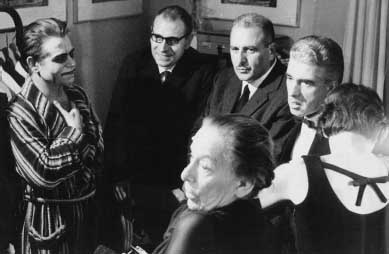
| 198689 | Member of the Central Committee of the SED. |
| 198392 | Productions include: Schillers Wallenstein in Burgtheater Vienna; Shakespeares Troilus and Cressida ; Fos Elizabeth By Chance a Woman with Alejandro Quintana; Brechts The Mother with Tenschert (with Renate Richter); Erdmans The Suicide ; Brechts Schwejk in the Second World War ; Kleists The Prince of Homburg at Berliner Ensemble and Schauspielhaus Zrich. |
| 1989 | Resigns position as President of the Akademie der Knste. |
| 1991 | Leaves the Berliner Ensemble. |
| 19922002 | Freelance productions include: Fallada/Dorsts Little Man, What Now? and The Good Person of Szechwan in Meininger Theater; Brechts Mr Puntila and His Man Matti and Richard III in Neues Theater Halle; Brecht Revue Denn wie man sich bettet, so ; adaptations of Goethes Iphigenia auf Tauris and Lacloss Les Liaisons Dangereuses in Theater des Ostens; von Hofmannsthals Jedermann and Rojass Celestina for WTT Remscheid; and Marlowes Dr. Faustus in cathedral, Halle. |

